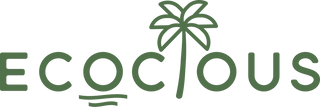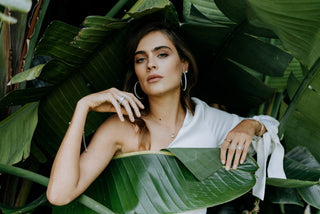Ariana Whittingham Interviews Monique Montfroy, founder of Texcoco Collective for Ecocious Mag.
Monique Montfroy is not just an Eco Luxe Designer, but an Accessory revolutionist showing it is possible to make "leather" sustainable.
And, we're not about to sell you some plastic-based "vegan leather" alternative either...
Although, Texcoco Collective is vegan friendly, cruelty free and handmade by a local family-run business in Mexico, its additionally free from plastic and made from plants, rather spiky ones in fact. Moniques search for a truly "sustainable leather" begun on a journalism project in Mexico, her designs are crafted entirely out of Cactus leather - often unknown, always underrated yet significantly more sustainable than all other options.
Many of us are familiar with the excessive water consumption that cotton requires across all stages in production, and unbeknown to most, leather is actually the thirstiest of all textiles! It slips under the radar unknown. Water consumption in the leather industry is considerably higher than all other textiles - if you're into crunching numbers I have some *shocking* figures for you!
A standard cotton t shirt requires 2,494 litres during creation VS a cow skin leather tote bag needs 17,128 litres (cow skin leather boots = 12,370 litres)
Moniques combined passion for our natural world and photojournalism lead her on many adventures before living, immersed in the gulf of Mexico - it was here that her mission to find an alternative solution for leather was born.
Ariana: What does the term "Sustainability" mean to you and why do you feel it is important to start a brand sustainably & ethically?
Now more than ever as a global society we are aware of our impact on the environment and the power that our purchasing decisions have. Eco-friendly and sustainable products are becoming more important because we have to make a change in what we consume. We will not stop consuming things, but we can start to make more informed choices about what we do consume. As businesses we are the ones that bring products to the people, so we are on the front line of deciding to make products that are better for the environment and cause the least amount of harm to nature, animals and humans.
Ariana: Before you started Texcoco Collective you have extensively travelled whilst pursuing photojournalism!
What did you learn from your travels and how did it play a part in the creation of your brand?
As a photographer I view much of the world through the lens of my camera and that has shaped the way I see and investigate my surroundings. I've always been deeply passionate about the human condition and caring for our natural world.
I've been a practising documentary photographer since graduating with honours in photojournalism in 2015.
In 2017 I went to Mexico for a 3-month artist residency program with an environmental NGO group. I photographed, lived and worked in far corners of the gulf of Mexico. Here I witnessed firsthand the detrimental impacts of plastic waste and overconsumption on underdeveloped communities.
I take a lot of inspiration from the colours, textures and shapes of these culturally rich nations.
When designing and selecting the first range of handbags for Texcoco Collective I wanted to emulate the feelings I experienced when travelling through the incredible landscapes of Central America.
Ariana: Tell us more about Cactus leather! Why it is (in our opinion) superior to other vegan /leather alternatives? Where did you find it?
As a sustainable, environmentally conscious brand it is important not to get caught up in greenwashing. Many brands promote their “vegan” leather products because they cause no animal harm, but most vegan leather goods are made from plastic, either PVC (polyvinyl chloride) or PU (polyurethane), which both contain toxic chemicals and phthalates.
These items are not biodegradable, and often end up in landfills when they are no longer wearable.
Cactus leather is an incredible material innovated in Mexico by the company Desserto. Desserto's cactus leather is organic, partially biodegradable, soft, durable, and high enough quality that it can be used to make clothing, accessories and furniture.
The cactus plant is grown on a totally organic farm, they use no herbicides or pesticides.
Cacti is awesome because it sucks extremely high amounts of Co2 from our atmosphere and it doesn't need to use any water irrigation system as cactus grows in extreme conditions.
As well, cactus is perennial, meaning that the plant can be harvested multiple times in its life cycle. When harvesting, they cut only the mature leaves of the plant without damaging the cactus itself, with a new harvest every 6-8 months.
Having spent a lot of time in Mexico and Central America, and after hearing about Desserto cactus leather, I knew I wanted to keep the manufacturing in Mexico and promote Mexican craft and labour.
Our handbags are made by a family owned and run handbag manufacturing business in Guanajuato, in central Mexico, just a 4 hour drive from where the material is grown and produced.
Guanajuato is the leather capital of Mexico, if not all of North America. I introduced cactus leather to a few manufactures in the area and many were not willing to make the ethical shift in material.
When we found this smaller producer they were very interested in the material and working with us to produce more environmentally friendly handbags.
Ariana: What would you like to change within the industry? How do you think that will become possible?
There is a lot I would like to see changed in the industry, and there is a lot of room for improvement as well. We are all becoming more and more aware of the environmental damage, human exploitation and animal harm that goes into our fashion, but often on an individual level, we turn a blind eye because these issues are so large for one person to tackle.
The major issue Texcoco Collective is addressing is production of leather.
The Global Fashion Agenda has found that manufacturing leather is the most environmentally impactful material from cradle to gate.
It takes an average 100,000 litres of water to produce one cow hide. That is enough water for one person's total consumption (drinking, shower, dish/clothes washing etc) for two years.
Not only is the water usage a huge problem but the health and lives of the people that tan the leather is at risk. As well as the environmental destruction caused from all the chemicals and waste run-off.
By choosing to use cactus or any plant-based leather alternative, you can contribute to a more ethical future.
Ariana: Where do you see Texcoco Collective, 5 years from now?
At the moment I am working towards creating a new range of not only handbags but camera straps, sunglasses cases and accessories through a strategic alliance with a grassroots NGO in Guatemala.
I Am Hope Guatemala provides women with support and employment which in turn supports the local economy and expansion of cultural practices and traditions.
Over the next 5 year I want to continue to collaborate and align with groups and skilled craftspeople to expand not only my own brand but also the reach and accessibility of the products produced in these incredible countries.
My aim is to show a different way of doing business that celebrates every person in the supply chain. I feel strongly about supporting creative and skilled crafts people.
Texcoco will continue to use innovative materials, such as cactus leather, that cause no animal suffering and the least harm to the environment. I want to create a fashion statement where cultures blend, celebrate and support each other and the earth.
I see Texcoco products being stock in like-minded boutique retail shops across Australia and hopefully more globally.
I want to move into a social enterprise business model and to become a B-corp certified business, to solidify our social and environmental stance and balance profit with purpose.
Ariana: If someone reading this would like to deepen their understanding towards living a more sustainable lifestyle, what tips or advice would you like to share with them?
Living a more sustainable lifestyle is choosing to live more consciously, which simply means taking extra time to think. You can make simple changes to your lifestyle which doesn't have to be hard, but always before you buy, ask yourself if you really need it.
Personally, I made a pledge to myself to only buy clothes from op-shops or clothes I make myself (with some exceptions on underwear and swimwear). I’ve been doing this for over 2 years now.
I actually get excited to go rummaging through op-shops to find unique pieces, often I find clothes that still have the tag on it, or like-new items that have a small hole in the seam which is easily fixed.
I always say, “you don't have to be vegan to care about the environment” but by reducing the amount of meat you consume you can reduce your environmental footprint. Try doing a meatless monday and go from there.
You look intelligent, thanks for stopping by!
Follow Monique & Texcoco Collective @texcoco.collective
Shop Cactus Leather, Sustainable Handbags now!
Use code: "IAMAMAZING" for 10% off your first order on Ecocoius.com.au


